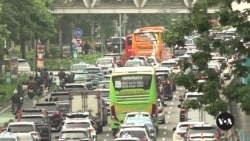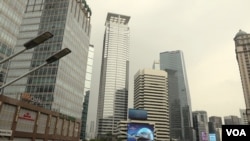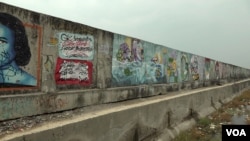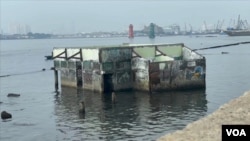Every weekday, Andika Hidayatullah weaves his motorbike through congested roads in Indonesia’s crowded capital from his home in the satellite city of Depok. He says all the traffic makes what should be a 40-minute commute almost twice as long.
“A car should be used with four occupants,” says Hidayatullah, 26. “But most workers here drive a car to their workplace by themselves, and that causes huge traffic.”
A report issued by the global public health organization Vital Strategies based on research by the Bandung Institute of Technology says vehicular emissions are Jakarta’s biggest source of air pollution — just one in a range of urban congestion problems that are prompting calls for better coordination between the city and its surrounding communities.
There were days last year when Swiss company IQAir ranked Jakarta’s air as the most polluted of any major city in the world.
Willy Sastrawijayadi, 37, says the polluted air makes him feel ill some days. “It affects the respiratory system, whether it’s coughing or feeling kind of like you have the flu.”
The city has about 10 million residents, but the greater Jakarta region has more than 30 million. When it comes to cities with the world’s worst road traffic congestion, navigation specialist Tom Tom ranked Jakarta 30th last year. First place is considered the worst among 387 cities in 55 countries. Jakarta has commuter trains and buses available, but old habits are proving hard to break.
“Public transport is currently much better than, let’s say, 10 or 20 years ago,” says Ahmad Gamal, associate professor in urban planning at the University of Indonesia. “What has not happened is people starting to leave their motorbikes and their cars.”
Gamal adds that one of the underlying reasons behind these quality-of-life issues is because Jakarta and its surrounding communities have not worked hand in hand to coordinate on a regional level.
“Jakarta gets all of the offices, gets all of the industries; but most of the housing projects, they probably need to go a little bit farther [out] because the land is much more expensive in Jakarta,” Gamal says. “So, naturally, the adjacent areas in their best interests in promoting development [were overbuilt].”
Gamal adds that overdevelopment in upstream communities leads to rivers overflowing downstream in Jakarta, flooding urban neighborhoods. “So much of the land upstream is overbuilt and unable to absorb much of the water.”
After heavy storms, Zainudin, who like many Indonesians uses only one name, and his neighbors along the Ciliwung River have to clean out mud that’s 30 centimeters thick inside their homes. “We’ve gotten used to dealing with this,” says Zainudin, 58, noting that he’s lived by the river his entire life.
Along the coast in North Jakarta, the government is extending a seawall. Just on the other side of it is the Wal Adhuna Mosque, which is no longer used because it’s always flooded. Small portions of North Jakarta have already been washed over by rising sea levels due to climate change and now it’s a race against time to prevent more of the city from being lost. About 40% of Jakarta is below sea level.
“The northern part of Jakarta is facing the biggest challenge because the sea is rising while the land is actually sinking,” Gamal says.
Gamal points to the fact that many Jakartans get their water from illegal wells tapping the ground water which is a major reason why the city is now sinking. The government is building pipes to get more of the public water supply across the city, but Gamal says that project could take 30 years to complete.
The national government is laying plans for an agglomeration council for Greater Jakarta to coordinate all of its local and regional governments.
But Gamal says it’s not clear yet if this council will have the authority it needs to succeed.
“It is going to work if it is a superseding authority on top of these regional governments, listening to their needs but capable of creating plans that are binding for them.”
Meanwhile, people like Andika Hidayatullah say they’re just hoping the government figures it out. “I’ve had enough of all the traffic and bad air,” he said.









